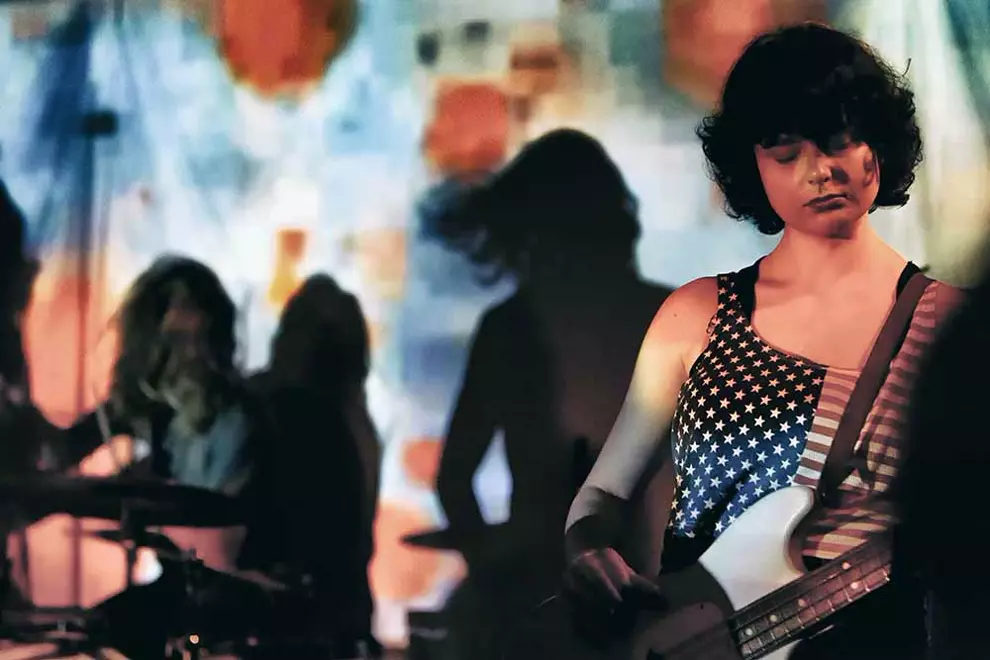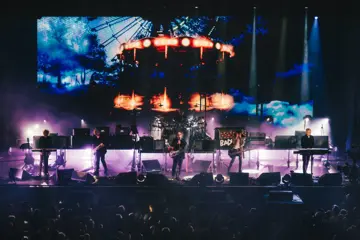Calling the furore over Adelaide’s Crown & Anchor as “just the tip of the iceberg”, the Greens in SA are to introduce to Parliament a plan it says could save music venues.
“It would give the community the right to buy these iconic pubs, maintaining their role in our cultural and community life,” explained the party’s Planning spokesperson, Robert Simms.
“We know that these buildings are about much more than bricks and mortar, they are spaces for creativity and connection.”
Based on the “common sense” model operating in the UK, local councils, community groups, and charities can nominate land or buildings of community value to be included on a register managed by the Minister for Planning.
If the owner decides to sell, they have to get the Minister's approval. They have to give 12 months' notice so the community has time to buy it. They also have to sell at market value.
But if the owner is selling the land or building for the same use—for instance, to continue using it as a pub—these rules don’t apply.
Simms readily agrees that the Greens plan won’t save the Crown & Anchor.
Don't miss a beat with our FREE daily newsletter
Its development application to be turned into a café and yoga space in a 19-storey students’ hostel, is due for hearing by the State Planning Assessment Commission in September.
A petition to save the venue is close to a target of 25,000 signatures. The number of SCAP (State Commission Assessment Panel) submissions by the Save the Cranker campaign reached a record 800+ by the time it closed.
The Greens plan has been attacked by developers. Bruce Djite, Executive Director of the Property Council of Australia, went on ABC Radio Adelaide to warn that the plan would “completely decimate live music throughout the whole state.”
He explained that with 80 per cent of SA’s live music showcased in pubs, “Any owner of a pub will straightaway start writing into leases that live music is not to be played in their venues.”
He also regarded as “preposterous” any law that stops a property owner from selling their asset on the open market to get the best price.”
The Greens also launched a campaign in Brisbane spearheaded by Stephen Bates after the announcement that The Zoo is closing in weeks.
“Our arts community and local hospo businesses are ringing alarm bells that The Zoo’s closure is just the beginning,” he said. “With dozens of small music festivals closing up too, live music all around Brisbane is in trouble.
“I'm calling on the State Government to buy smaller buildings and venues and lease them back out to not-for-profits and councils to create spaces for creative industries and artists.”
Nightmares
Paying commercial rent is one of the nightmares facing venues. Additionally, the idea of the local community banding together to run a music venue is a “good one,” said Tam Boakes of Adelaide’s Jive. “Communities fully understand the importance of music venues existing, not just to help musicians but as a space where locals can gather and hang.”
Many grassroots venues actively support community values. Juliette Lalli, band booker for the Retreat Hotel in inner-city Melbourne, for instance, encourages lineups with at least one non-male member and prioritises people of colour and femme/non-binary people.
The Australian sector is looking at the achievements of the Music Venue Trust in the UK, where 35 per cent of grassroots music venues closed in the past 20 years.
A report published in January revealed that 2023 was “the most challenging year” for UK grassroots venues. 125 abandoned live music, with over half of these shutting entirely. Soaring utility bills and an average 37.5 per cent rent hike put the surviving 835 venues at risk.
The Music Venue Trust’s #OwnOurVenues fundraising drive raised £2.2 million (AU$4.9 million) in two years, with nine venues identified for purchase under a “friendly landlord” scheme.
Two have been bought so far. The deal is they remain as music spaces but also become hubs hosting community events throughout the day.
800 members of the public have invested, supported by artists such as Ed Sheeran and bodies such as Sony Music Entertainment, Warner Music, and Amazon Music, while Arts Council England provided a grant of £500,000 ($953,242.65).
Mark Davyd, CEO of the MVT, explained it’s a given that owners of buildings “are committed more to profitability than supporting the sector.
“Our answer is to put ownership of music venues in the hands of people who love live music – a project so radical it hasn’t been tried anywhere else in the world.
“We’re going to prove that this type of ownership can provide real long-term benefits to artists, audiences and local communities.”
Interesting Model
Dr. Sam Whiting, lecturer in Creative Industries at the University of South Australia and author of Small Venues: Precarity, Vibrancy and Live Music, has told TheMusic.com.au, “It’s a really interesting model because you’re purchasing the freeholds to these venues and at scale which means you drastically lessen your overheads for running those live music spaces.
“But then you can redirect any further profit to wages or the musicians themselves. So it takes the profit motive out of the exchange. They are no longer commercial enterprises but able to draw on that network which finance themselves collectively.”
John Wardle of the Live Music Office, which works with local government and music associations on their live music strategies, also thinks it an idea well worth investigating.
“Local councils already have extensive infrastructures for events and live performances,” he pointed out. “They have town halls, community centres and public domain buildings, and tool kits for putting on events.”
Let’s not forget, Wardle added, “In suburbs throughout Australia, there are registered clubs, RSLs, bowling clubs, leagues clubs, and the like. They have the infrastructure, resources, production, and hospitality divisions set up.”
Venue veterans contacted by TheMusic.com.au for comment wanted to see more details of how the model would work before they commented.
“If it’s state governments or councils getting involved, are they the best persons to oversee the running of a venue?” asked one. “How much of the decision-making will they have?”
Said another, “We generally set up music venues because we’re passionate about the music we book, and it’s the thrill of giving new talent a break. Will we have to compromise? Will we have to compete with other venues, whom we see as part of our community?”
A community group running a venue could be made up of people who give financial and marketing input.
But once again, “How many cooks do you want in the kitchen? What happens if the whole thing turns into a shitstorm?”
Arena Ticket Levy
The live sector is pushing for the introduction of an Arena Ticket Levy. $1 from each ticket sale would support small- to medium-sized independent venues through a trust. The idea is to support their maintenance and survival and ensure they keep generating new talent.
It’s an idea that John Collins of The Triffid and Fortitude Music Hall in Brisbane is looking into.
“Who knows, it could be passed on to the consumer,” he said. “But at this point in time, we should table lots of ideas because it is important.
“Because a city is defined by its culture. Just because it’s not making money now, doesn’t mean it won’t in the future. A city that pulses with great music and great art is what you need. That’s why people go to Melbourne.”
The Queensland Government is considering the idea of a Brisbane Night Mayor. A piece in the Courier Mail claimed Collins was a front-runner and regarded by the sector as best for the role.
With the State Budget approaching, peak music association QMusic has pitched several strategies to the State Government.
Its CEO Kris Stewart expanded, “The First thing is helping venues survive that viability breaking point—so something immediate that recognises the cash issues they're currently facing. Let's first try not to lose anymore.”
Other proposals include tax rebates similar to those for the film industry, changing the tax status of smaller venues, and collective insurance brokering.
The sector is calling for a tax offset. APRA AMCOS found that in a May 2024 survey of venues, nightclubs, and promoters, almost 80 per cent considered it the most important solution to the current crisis.
Its CEO, Dean Ormston, pointed out, “A tax offset to support the growth of live music would not only be a catalyst for the social and cultural development of live music, [but] it would also provide an injection of confidence across the tourism and hospitality economy.”
Getting People In
One of QMusic’s pitches to the Queensland Government looks at how to attract punters to go to the venue in the first place.
“We need to get people in,” stressed Kris Stewart. “That could be voucher systems – our recommendation was to examine what we've learned by crisis tourism Industry support following weather events. We have some systems in place.
“The other could be age-based culture cards, which could allow younger folks cheaper access to events.”
The latter is adopted in many European countries
Germany’s €200 ($325. 56) KulturPass, introduced in 2022 to be given to everyone turning 18, had generated €3.2 million ($5.2 million) in revenue for cultural products, events, and services by the start of this year.
Various Australian states introduced Dining and Entertainment vouchers in the post-COVID-19 era. In Victoria, the program put $25 million into people’s pockets and generated $65 million in spending.
In its submission to the recent Senate inquiry into the live sector, the Live Music Office advocated a music version of dining vouchers.
“Putting money in people’s pockets is the key,” Wardle clarified. “If you want to go to a gig or festival, we’ll subsidise your ticket.
“It’s proven it can can be done across tiers of government, we have seen these vouchers work on national, state and local levels. It would really broaden participation and the experience.”
The problem with government funding at the moment, he commented, is that it’s based on supply and not on demand.
“There should be equal focus. We’re putting all this focus on recording, touring and soundproofing – all valuable, essential and worthy.
“But what are we doing about getting people to go and see live music, communities building value, and getting people through the door? That is starkly missing when we look at investment.”
Some venues offer the first drink free, or snack discounts at certain times. For John Collins, “Make the show compelling, add activations to make it more exciting. Get good support acts, or maybe have a DJ in the beer garden afterwards. Having them in longer for another 45 minutes to change the bottom line.”
Sam Whiting warned the trend of younger punters less inclined to check out new acts is increasingly acute.
“Grassroots venues have a much deeper problem that has to be addressed. It goes back before COVID, to the advent of streaming.
“Once music fans got their exposure to new bands from triple j, community radio and the music press. They searched them out in grassroots spaces and followed them as they built up their careers.”
But with streaming’s switch to algorithms and curated playlists, “a lot of young people are not getting exposed to local artists as often. So the connection between audiences and local artists has been disrupted somewhat.”
On May 28, the Australian Live Music Business Council is holding a national forum called Future Audiences – Are Young People Into Live Music? It’s held at Blutes Bar in Fortitude Valley (or accessed online) with input from The Push, QMusic, Association of Artist Managers and Gyrostream.
You can register here to get involved.
The future of grassroots venues has to be solved, warned James Legge, Managing Director of Freo Social in Fremantle. “Artists will simply stop producing music as it’s not financially viable for them to continue doing so.”
















